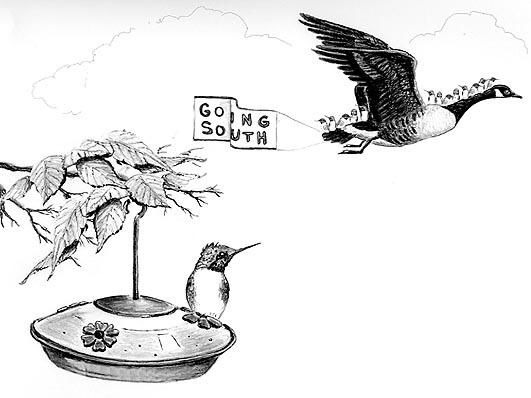
Dear Bird Folks,
I know you are probably sick of answering questions about hummingbirds, but I really need to know the answer to this question soon. For the second year in a row my neighbor has warned me to take down my hummingbird feeder. He said that by feeding hummingbirds late in the season they will be encouraged to remain here, not migrate south and could die when winter arrives. Is any of this true? Should I take my feeders down?
-Tess, Alton, NH
No, No, No Tess,
I’m not sick of writing about hummingbirds. I love hummingbirds. Okay, maybe I am getting a little sick of writing about them, but what I really am really getting sick of are neighbors with bad advice. Nosey neighbors, has there ever been a dopier group of people? In fact, according to the latest USA Today poll, the nosey neighbor has moved into first place, overtaking in-laws as the #1 provider of misinformation. Now that’s saying something.
To begin with, hummingbird migration is different than many other birds’ migration. There are no massive flocks of hummingbirds staging up on the power lines like the swallows do or swarms descending into the marshes like blackbirds or long V’s streaming across the fall sky like geese. Hummingbirds migrate alone. The truth is hummingbirds hate each other. They don’t need a large flock of other hummers telling them when it’s time to leave or gathered around for protection. They are plenty street wise and can handle themselves. The other thing is that these independent birds don’t even head south at the same time, some go early, some go later. Their migration is drawn out over several months. Why?
Unlike most songbirds, hummingbirds don’t pair up as long-term couples. The male and female hook up only briefly to mate and then go their separate ways. (I told you they hated each other.) The females build the nest, lay the eggs (you may have already guessed that part), set on the eggs, hatch and raises the entire brood all by herself. The only thing the males do is mate and that’s it. As part of nature’s pay back for making them so small, male hummingbirds are allowed to mate with as many females as they can attract. Once their “work” is done and all of the females are busy tending the nests, the males become bored and start thinking about heading back down south, probably to rest.
Hummingbird migration may start as early as late July, for the males, and will continue until into October for the females and young birds. If your neighbor’s statement were true, in order avoid disrupting migration, you would have to take your feeder down in July. Heck, in New Hampshire, most people haven’t even finished digging their feeders out of the snow banks until July.
It certainly may be safe to assume that our feeders are a benefit to hummingbirds, but what they really depend upon are flowers. Hummingbirds feed off both the nectar flowers provide and the minute insects that are attracted to them. Tons of flowers, both wild and cultivated, are in full bloom in late summer. Why would the birds leave when their is so much natural food around? Because they know that the big chill is coming. Migratory instincts are much too strong to be swayed by a few posies. Neither flowers nor a few bird feeders are going to keep the hummers from getting out while the getting is good.
Every year some hummingbird somewhere ends up at a feeder long after it should have gone south. Newspapers love to print pictures of a confused hummingbird at a feeder in December. The suggestion, by some people, usually a neighbor, is that the artificial food supply discouraged the bird from migrating. Well, the reality is that the late bird probably did migrate, it just went the wrong way. Occasionally birds get their brain wires crossed and they migrated north or east instead of south and become lost. Just like some people, usually a neighbor, drive the wrong way on a one way street. It happens.
Yes, you can leave your hummingbird feeder out as long as you’d like Tess. Your bird feeder will not interfere with bird migration. However, it will sometimes help to keep a lost bird alive, at least for a while. Sadly, the migration instinct only lasts for a short while. Even the onset of cold weather won’t force a bird that has strayed to move on. Eventually it will be forced to deal with the unforgiving winter. Nature has a rather harsh way of taking the misfits out of the gene pool. Too bad nature doesn’t always take the misfits out of the neighborhood.